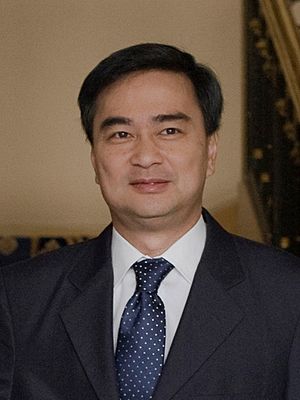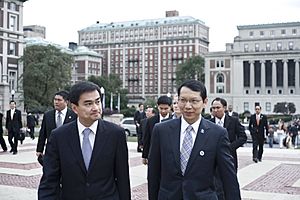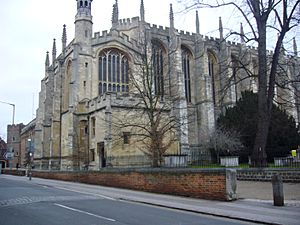Abhisit Vejjajiva facts for kids
Quick facts for kids
Abhisit Vejjajiva
MPCh MWM
|
|
|---|---|
|
อภิสิทธิ์ เวชชาชีวะ
|
|

Abhisit in 2010
|
|
| 27th Prime Minister of Thailand | |
| In office 17 December 2008 – 5 August 2011 |
|
| Monarch | Bhumibol Adulyadej |
| Deputy |
See list
|
| Preceded by | Chavarat Charnvirakul (acting) |
| Succeeded by | Yingluck Shinawatra |
| Leader of the Opposition | |
| In office 16 September 2011 – 8 December 2013 |
|
| Prime Minister | Yingluck Shinawatra |
| Preceded by | Himself (2008) |
| Succeeded by | Sompong Amornwiwat (2019) |
| In office 23 April 2005 – 17 December 2008 |
|
| Prime Minister |
|
| Preceded by | Banyat Bantadtan |
| Succeeded by | Himself (2011) |
| Member of the House of Representatives for the Democrat Party List |
|
| In office 6 January 2001 – 5 June 2019 |
|
| Member of the House of Representatives for Bangkok |
|
| In office 22 March 1992 – 9 November 2000 |
|
| Constituency |
|
| Leader of the Democrat Party | |
| In office 6 March 2005 – 24 March 2019 |
|
| Preceded by | Banyat Bantadtan |
| Succeeded by | Jurin Laksanawisit |
| Minister to the Office of the Prime Minister | |
| In office 14 November 1997 – 17 February 2001 |
|
| Prime Minister | Chuan Leekpai |
| Preceded by |
|
| Succeeded by |
|
| Personal details | |
| Born |
Mark Abhisit Vejjajiva
3 August 1964 Newcastle upon Tyne, England, United Kingdom |
| Citizenship |
|
| Political party | Independent |
| Other political affiliations |
Democrat (1992–2023) |
| Spouse | Pimpen Vejjajiva |
| Children | 2 |
| Alma mater | St John's College, Oxford Ramkhamhaeng University |
| Signature |  |
Abhisit Vejjajiva (born August 3, 1964) is a Thai politician. He served as the 27th prime minister of Thailand from 2008 to 2011. He was also the leader of the Democrat Party from 2005 until 2019.
Abhisit was born in England to Thai parents. He holds both British and Thai citizenship. He studied at Eton College and University of Oxford in England. After his studies, he taught economics at universities in Thailand. He became a member of the Thai House of Representatives at age 27. From 1997 to 2001, he was a minister in the Prime Minister's Office.
He became prime minister on December 17, 2008. This happened after the Constitutional Court of Thailand removed the previous prime minister from office. At 44 years old, he was one of Thailand's youngest prime ministers in over 60 years.
During his time as prime minister, Abhisit focused on improving life for people in rural areas. He introduced plans to boost the economy. His government faced major protests in 2009 and 2010. After a poor election result in 2019, he resigned as the Democrat Party leader.
Contents
Early Life and Education
Abhisit Vejjajiva was born in Newcastle upon Tyne, England. His parents were Thai. He went to school in England from age eleven, attending Scaitcliffe and then Eton College. Eton College is a famous boarding school.
He earned two degrees from St John's College, Oxford: a bachelor's degree in philosophy, politics, and economics, and a master's degree in economics. While studying in England, he visited Thailand many times. One trip in 1983 was with his classmate, Boris Johnson, who later became the UK Prime Minister.
After finishing his studies in England, Abhisit moved to Thailand. He earned a law degree from Ramkhamhaeng University. He also taught economics at the Chulachomklao Royal Military Academy and Thammasat University. He speaks both Thai and English fluently.
Family Life
Abhisit is married to Pimpen Sakuntabhai. She was his classmate in elementary school. Pimpen used to be a dentist and now teaches mathematics at Chulalongkorn University. They have two children, a daughter named Prang and a son named Pannasit.
Abhisit also has two sisters. One is a child psychiatrist, and the other is a well-known author. His family has a long history in Thailand.
Political Journey
Abhisit started his political career in 1992. He was elected as a Member of Parliament (MP) for Bangkok. He was re-elected several times. He served as a spokesman for the Democrat Party and for the government. He also worked as a minister in the Prime Minister's Office.
Leading the Democrat Party
In 2003, Abhisit tried to become the leader of the Democrat Party but lost. Two years later, in 2005, he became the new party leader. This happened after the party lost the general election.
In 2006, the prime minister at the time, Thaksin Shinawatra, called for new elections. Abhisit and other opposition parties decided not to take part in these elections. They believed the elections were not fair.
Later in 2006, the military took control of the government. Abhisit said he did not support this action. However, he urged the military leaders to quickly return power to the people. He also supported a new constitution that was written in 2007.
Becoming Prime Minister
In 2008, Thailand faced a political crisis. The Constitutional Court removed the prime minister from office. After this, a new group of political parties formed a coalition with the Democrat Party. This allowed Abhisit to be elected as prime minister. He officially took office on December 17, 2008.
As Prime Minister (2008–2011)

When Abhisit became prime minister, Thailand was facing economic challenges. He introduced a "People's Agenda" to help ordinary citizens. This plan focused on improving living conditions for people in rural areas and for working families.
He launched two major economic plans. One was a large plan to improve roads and other infrastructure. The other provided money to people to help them. During his time, the stock market and the value of the Thai currency (baht) improved.
His government also faced large protests in 2009 and 2010. There were serious conflicts between the military and protesters during these times. Abhisit tried to start a plan to investigate these events.
Thailand's army also had clashes with Cambodian troops during his term. The conflict in southern Thailand also continued.
After his party lost the 2011 general election, Abhisit resigned as party leader. However, he was later re-elected to lead the party again. In 2019, after another election where his party did not do well, he resigned as party leader once more.
Honors and Awards
Abhisit has received several important awards from the King of Thailand. These include:
- Knight Grand Cordon (Special Class) of the Most Exalted Order of the White Elephant (1999)
- Knight Grand Cordon (Special Class) of the Most Noble Order of the Crown of Thailand (1998)
He also holds the military rank of Sub Lieutenant in the Royal Thai Army.
Images for kids
-
Abhisit and Malaysia's former premier Mahathir Mohamad, September 7, 2012
See also
 In Spanish: Abhisit Vejjajiva para niños
In Spanish: Abhisit Vejjajiva para niños
 | Lonnie Johnson |
 | Granville Woods |
 | Lewis Howard Latimer |
 | James West |




